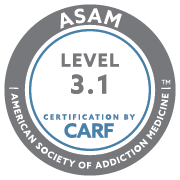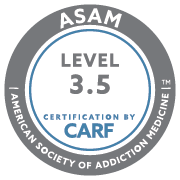At Rimrock, the Twelve Step program of Alcoholics Anonymous provides the framework for our treatment program. Often times, people see the twelve steps as a strict and religious guideline towards treatment. This may lead individuals seeking help to turn away from the program and miss out on the treatment they need. It is important to understand that the Twelve Step program is more a spiritual guideline and not a religious one. This contrast is very important to understand because the program does not require belief in a God or religion. Instead, the focus is on a “higher power” that you define!
There are six steps that specifically mention God or a higher power and these can be a sticking point for many seeking treatment. However, at Rimrock when we talk about a “higher power” or “God” we are talking about a power that you define. We don’t force religion on anyone nor do we discriminate based on anyone’s beliefs. At Rimrock, patients are able to define a higher power as they understand it. Ultimately, there are no rules defining your higher power other than the power must be greater than the individual.
Rimrock’s inpatient treatment is described as an introduction to the Twelve Step program. During their stay, patients will work with a counselor and are given a Recovery Journal they complete before leaving. This journal along with Rimrock’s counselors will guide patients through the first five steps of the program and prepare them to continue on with the remaining seven. Once the 12 steps are completed, it becomes a “Lifelong Guide.”
In order to understand the Twelve Step program better, one of our inpatient counselors, Jason Hakert, broke the steps down into three phases. The first phase includes steps one, two and three of the program and is focused on trusting a higher power. These steps, help patients understand they are powerless over their addiction, believe a power greater than themselves can restore sanity and they turn their will over to this higher power.
The second phase is made up of steps four through nine. During this phase, patients clean house or begin the process of getting sober. Patients will discover the truth about themselves in step four and then begin to understand and give up past ways and destructive behaviors while creating strengths and positive messages of change in step five. At this point, patients will have completed their time at Rimrock, but they will continue on the Twelve Step journey. This includes preparing for God to remove defects of character and humbly asking him to remove these shortcomings. Patients then make a list of persons harmed and begin making amends when possible.
The final phase of the Twelve Step program is to begin helping others. Patients will continue to take personal inventories and admit when they are wrong. They will seek prayer and meditation to improve contact with God. This includes seeking his knowledge and the power to carry out this will. Finally, patients will have a spiritual awakening as a result of these steps. They will then try and carry this message on to other alcoholics and continue to practice these principles in all of their affairs.
For many, the Twelve Step program is only the beginning of their journey in sobriety. Rimrock understands the power that this program has to help individuals on this journey and it is why we use the program as the framework for our treatment. Inpatient treatment at Rimrock is designed to help patients begin the program and then carry it with them as they return to their day-to-day life. If you’d like to understand more about Rimrock’s inpatient treatment and how we use the Twelve Step program, contact us today!
THE TWELVE STEPS OF ALCOHOLICS ANONYMOUS
- We admitted we were powerless over alcohol – that our lives had become unmanageable.
- Came to believe a Power greater than ourselves could restore us to sanity.
- Made a decision to turn our will and our lives over to the care of God as we understood Him.
- Made a searching and fearless moral inventory of ourselves.
- Admitted to God, to ourselves and another human being the exact nature of our wrongs.
- Were entirely ready to have God remove all these defects of character.
- Humbly asked Him to remove our shortcomings.
- Made a list of all persons we had harmed, and became willing to make amends to them all.
- Made direct amends to such people whenever possible except when to do so would injure them or others.
- Continue to take personal inventory and when we were wrong promptly admitted it.
- Sought through prayer and meditation to improve our conscious contact with God as we understood Him, praying only for knowledge of His will for us and the power to carry that out.
- Having had a spiritual awakening as a result of these steps, we tried to carry this message to alcoholics and practice these principles in all of our affairs.
Rimrock
1231 North 29th Street Billings, MT 59101
406.248.3175






